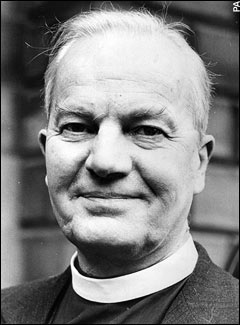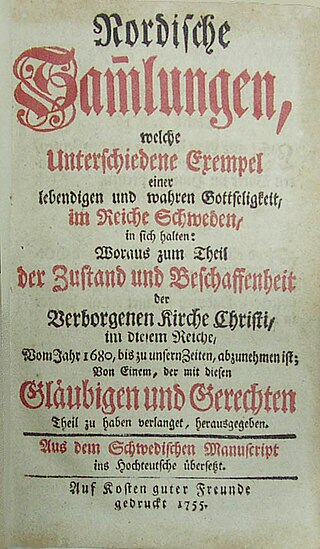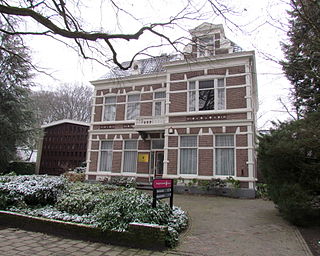
Evangelicalism, also called evangelical Christianity or evangelical Protestantism, is a worldwide interdenominational movement within Protestant Christianity that affirms the centrality of being "born again", in which an individual experiences personal conversion; the authority of the Bible as God's revelation to humanity ; and spreading the Christian message. The word evangelical comes from the Greek (euangelion) word for "good news".

Pietism, also known as Pietistic Lutheranism, is a movement within Lutheranism that combines its emphasis on biblical doctrine with an emphasis on individual piety and living a holy Christian life.

Karl Barth was a Swiss Reformed theologian. Barth is best known for his commentary The Epistle to the Romans, his involvement in the Confessing Church, including his authorship of the Barmen Declaration, and especially his unfinished multi-volume theological summa the Church Dogmatics. Barth's influence expanded well beyond the academic realm to mainstream culture, leading him to be featured on the cover of Time on 20 April 1962.

The charismatic movement in Christianity is a movement within established or mainstream Christian denominations to adopt beliefs and practices of Charismatic Christianity with an emphasis on baptism with the Holy Spirit, and the use of spiritual gifts (charismata). It has affected most denominations in the US, and has spread widely across the world.

Alister Edgar McGrath is a Northern Irish theologian, Anglican priest, intellectual historian, scientist, Christian apologist, and public intellectual. He currently holds the Andreas Idreos Professorship in Science and Religion in the Faculty of Theology and Religion, and is a fellow of Harris Manchester College at the University of Oxford, and is Professor of Divinity at Gresham College. He was previously Professor of Theology, Ministry, and Education at King's College London and Head of the Centre for Theology, Religion and Culture, Professor of Historical Theology at the University of Oxford, and was principal of Wycliffe Hall, Oxford, until 2005.

Thomas Forsyth Torrance, commonly referred to as T. F. Torrance, was a Scottish Protestant theologian and minister. Torrance served for 27 years as professor of Christian dogmatics at New College, in the University of Edinburgh. He is best known for his pioneering work in the study of science and theology, but he is equally respected for his work in systematic theology. While he wrote many books and articles advancing his own study of theology, he also edited the translation of several hundred theological writings into English from other languages, including the English translation of the thirteen-volume, six-million-word Church Dogmatics of Swiss theologian Karl Barth, as well as John Calvin's New Testament Commentaries. He was a member of the famed Torrance family of theologians.
Evangelische Omroep or EO is an Evangelical broadcast television network in Netherlands. It is one of the twelve member-based broadcasting associations contributing to the Netherlands Public Broadcasting system.
Nancey Murphy is an American philosopher and theologian who is Professor of Christian Philosophy at Fuller Theological Seminary, Pasadena, CA. She received the B.A. from Creighton University in 1973, the Ph.D. from University of California, Berkeley in 1980, and the Th.D. from the Graduate Theological Union (theology) in 1987.

Christian universalism is a school of Christian theology focused around the doctrine of universal reconciliation – the view that all human beings will ultimately be saved and restored to a right relationship with God. "Christian universalism" and "the belief or hope in the universal reconciliation through Christ" are concepts that can even be understood as synonyms. Opponents of this school, who hold that eternal damnation is the ultimate fate of some or most people, are sometimes called "infernalists."

Radical Pietism are those Christian churches who decided to break with denominational Lutheranism in order to emphasize certain teachings regarding holy living. Radical Pietists contrast with Church Pietists, who chose to remain within their Lutheran denominational settings. Radical Pietists distinguish between true and false Christianity and hold that the latter is represented by established churches. They separated from established churches to form their own Christian denominations.
The term New Atheism was coined by the American journalist Gary Wolf in 2006 to describe the positions of some atheist academics, writers, scientists, and philosophers of the 21st century.
Eberhard Jüngel was a German Lutheran theologian. He was Emeritus Professor of Systematic Theology and the Philosophy of Religion at the Faculty of Protestant Theology of the University of Tübingen.

Protestantism is a branch of Christianity that follows the theological tenets of the Protestant Reformation, a movement that began seeking to reform the Catholic Church from within in the 16th century against errors, abuses, and discrepancies.

God in the Age of Science? A Critique of Religious Reason is a 2012 book by the Dutch philosopher Herman Philipse, written in English and published in the United Kingdom. Philipse found his Atheist Manifesto (1995) to be too hastily and superficially written, and decided to set up a more complete work to systematically refute all the arguments for the existence of God and adherence to any form of theism.

The Assemblies Jehovah Shammah are an Evangelical Christian network of churches that originated in India, which is still home to the great majority of them. The Evangelical publication Operation World estimates their numbers, as of 2010, at 310,000 adults and children in 910 assemblies, as their churches are generally known. Other sources estimate upwards of two thousand congregations, with a large presence in the State of Andhra Pradesh. The movement was founded in 1942 by evangelist Bakht Singh, whose theology and ecclesiology were much influenced by the Open Brethren. Although historically distinct from the Indian Brethren movement, which originated from missionary endeavours, the Assemblies Jehovah Shammah have a lot in common with it and are sometimes considered a part of the Brethren movement worldwide.
The Open Brethren, sometimes called Christian Brethren, are a group of Evangelical Christian churches that arose in the late 1820s as part of the Assembly Movement within the Plymouth Brethren tradition. They originated in Ireland before spreading throughout the British Isles, and today they have an estimated 26,000 assemblies worldwide.

Yung-Han Kim is a professor, a theologian and an ordained minister in South Korea. He is a well known scholar in South Korea. He founded the Korea Reformed Theological Society in 1996, served as the 1st, 2nd, 3rd president of the Society. He set up the Graduate School of Christian Studies in Soongsil University, served as the 1st, 2nd, 3rd, 5th and 6th Dean. He served for 34 years as professor of systematic theology and Christian Philosophy at Soongsil University. Founder of Academia Christiana, he also has served as the president of Academia Christiana since 1988. He made the Shalomnabi, a civic organization, in 2010, has been serving as its chairman. He contributed more than 30 articles only in the Journal of Korea Evangelical Theological Society <Bible and Theology>. He published more than 20 books in Systematic Theology and Christian Philosophy, has been studying and contributing in the areas of dogmatics, Reformed theology, modern theology, hermeneutics, Christian Culture and Christian Spirituality. He was a chairman of Korea Evangelical Theological Society, a chairman of Korea Society for Hermeneutics (2004-2006), a chairman of Christian Philosophy Society (2006-2012), and a chairman of Korea Reformed Theology Society.

The Theological University of Apeldoorn (TUA) is the Dutch theological university of the Christian Reformed Churches. More than 130 students study at the university in Apeldoorn. The theological course lasts six years. The student is in the bachelor's program for the first three years. This has a more orientating character, and includes the languages Classic Greek and Koine Greek, Latin and Biblical Hebrew. In the three-year master's program that follows, further studies and specialization are discussed. The training is specifically aimed at educating pastors. Furthermore, one tries to keep together the reformed character of the faith and the church and the scientific level of the university. The syllabus consists of subjects such as ethics, apologetics, Old and New Testament, canonical studies, dogmatics, church history, church law and civil subjects.
Willem Hendrik Velema was a Dutch professor, pastor and theologian. He was a member of the Christian Reformed Churches.

Andries Gerrit Knevel is a Dutch theologian, author and presenter on Dutch radio and tv. From 1993 until 2006, he was television director of the Evangelische Omroep, a Dutch broadcasting organisation with Protestant foundations.













